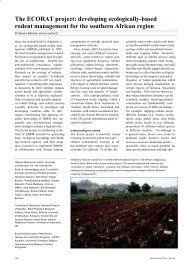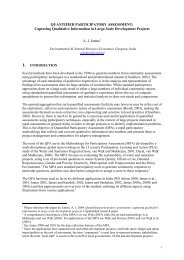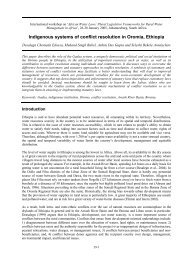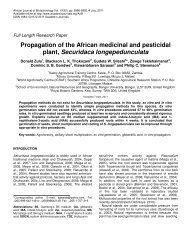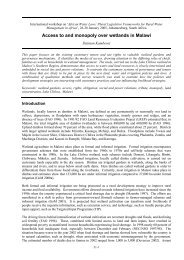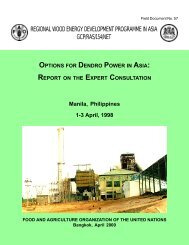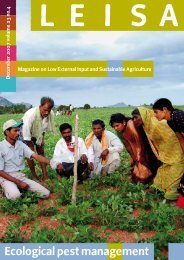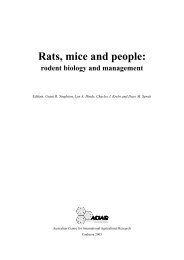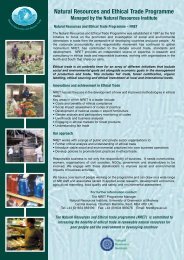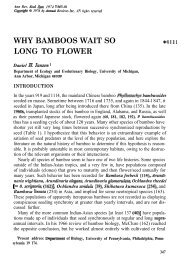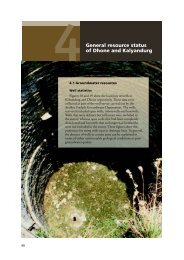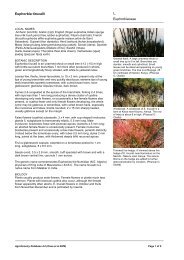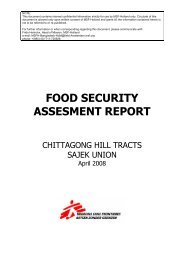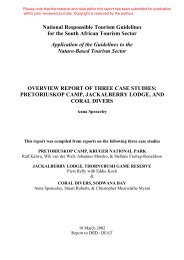Access to Rural Non-Farm Livelihoods - Natural Resources Institute
Access to Rural Non-Farm Livelihoods - Natural Resources Institute
Access to Rural Non-Farm Livelihoods - Natural Resources Institute
You also want an ePaper? Increase the reach of your titles
YUMPU automatically turns print PDFs into web optimized ePapers that Google loves.
Box 3. The Kamakuma Women’s Agriculture & Bakery Group 72<br />
The group was formed in 1993 with the aim of supporting orphans, as well as receiving training in<br />
IGAs and NGO support, and acting as an example <strong>to</strong> others, as they were the first in this area. The<br />
original members were all friends – they are all still with the group, although four new members<br />
have also joined. The members each contribute 2,000 shillings per year, and new members are<br />
required <strong>to</strong> pass a one month trial period before being fully accepted in<strong>to</strong> the group. They started<br />
with farming <strong>to</strong>gether on a piece of land owned by the Chairperson but set aside for the group’s use.<br />
The crops are sold and the money divided in three ways – some is used <strong>to</strong> support the orphans,<br />
particularly with secondary school fees, some is disbursed in rotation, with one member getting<br />
30,000 shillings each month <strong>to</strong> start or develop an IGA, or help with household expenses, and the<br />
rest is put in<strong>to</strong> a bank account and saved for “problem” times. The group also bakes bread and rolls<br />
for sale. The Chairperson and one of the male members of the group, Sulayiman Ka<strong>to</strong>, were taught<br />
how <strong>to</strong> bake by the Irish Fund for Community Development, and they then taught the others. The<br />
money for the first batch of ingredients came from their farming work, but World Vision gave them<br />
a loan <strong>to</strong> cover the costs of building an oven – someone came <strong>to</strong> build it for them, and showed them<br />
how <strong>to</strong> maintain and repair it. They bake on Fridays and Sundays, and divide themselves in<strong>to</strong> two<br />
shifts, one for each day. The Chairperson and Sulayiman Ka<strong>to</strong> go <strong>to</strong> Kyotera once a month <strong>to</strong> buy<br />
the ingredients, and fuelwood is collected locally by the members. They make about 15 large loaves<br />
and 140 small buns in a day – most is sold locally, with some going <strong>to</strong> Rakai or other nearby places,<br />
and some is consumed by the members and their families. A portion of the proceeds is returned as<br />
working capital, with the rest being saved with the group’s other money. They want <strong>to</strong> improve the<br />
oven by replacing the original iron bars with wire mesh which they think would be easier <strong>to</strong><br />
maintain, but they lack capital. The do not want <strong>to</strong> go back <strong>to</strong> World Vision for another loan as<br />
although they managed <strong>to</strong> repay the first one, it was very difficult as the period was very short, so<br />
they are looking for other sources. They also want <strong>to</strong> expand the baking business so that they bake<br />
daily, and in the future would like <strong>to</strong> start making soap – they have the skills, but lack the equipment<br />
and the capital <strong>to</strong> buy it. In general, although neighbours, friends, and family were initially sceptical<br />
of their ability <strong>to</strong> start up and run a business, they now recognise their success and support them.<br />
They attribute their success <strong>to</strong> the strength of the group – they know and trust one another, and share<br />
the same interests and aims. Other groups struggle or fail when they include members who do not do<br />
their share of the work, or do not pay their dues, or even cheat.<br />
Carpentry is primarily undertaken by men, and requires specialist training and <strong>to</strong>ols. Many<br />
carpenters survive in hard times through sales of coffins.<br />
Box 4. Mani Maga, carpenter<br />
Mani is 35 years old, and lives with his wife Ada and their four children. He started his carpentry<br />
business back in 1985 having learnt the skills while working at the Works Department at the district<br />
headquarters in Rakai. He bought his <strong>to</strong>ols with his wages from the Works Department, and has a<br />
workshop next <strong>to</strong> his home on the main road <strong>to</strong> Kibaale. He makes furniture (beds, tables, etc.),<br />
which he sells from the workshop <strong>to</strong> people from Byakabanda and the surrounding villages. He buys<br />
the timber in Kyotera, but it is expensive <strong>to</strong> bring it back <strong>to</strong> Byakabanda, and costs have increased so<br />
much in recent months as a result of rising fuel prices that he thinks he will have <strong>to</strong> raise the prices<br />
of the finished goods. However, this is a problem, as demand is already low – it is always seasonal,<br />
as it depends on farmers having money, but has been particularly poor in recent times as a result of a<br />
series of very meagre harvests. He and Ada also farm, and in the low seasons they supplement their<br />
income by buying vegetables and fruit, such as <strong>to</strong>ma<strong>to</strong>es, onions, and sweet bananas, in Kibaale and<br />
then reselling them from a stall outside their home. Carpentry used <strong>to</strong> be the household’s main<br />
source of income, but if things do not improve after the next harvest, Mani is thinking about putting<br />
more energy in<strong>to</strong> expanding the vegetable and fruit business instead. He sees his household as<br />
belonging <strong>to</strong> the middle income group in the village – they can afford <strong>to</strong> use hired farm labour<br />
during busy periods – but fears it will be difficult <strong>to</strong> maintain their standard of living as they grow<br />
older. His father, a sheikh, lives nearby, and is quite poor in his old age, although Mani supports him<br />
by buying household supplies such as salt and sugar.<br />
72 For a list of members see Appendix 6.<br />
38



